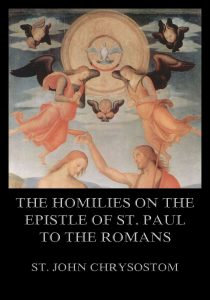The Homilies On The Epistle Of St. Paul To The Romans – St. John Chrysostrom
St. Chrysostom’s Commentary on the Epistle to the Romans in one of the closest and most argumentative of thse he has left us. The style of the Epistle itself called for this, being such as almost constantly to remind an attentive reader of the necessity of froming some notion of the views and feelings of the persons to whom it was orginally addressed. To this point St. Crysotom has paid much attention, and has consequently obtained a far clearer view of the doctinal bearing of the Epistle than most other commentators. His early rhetorical education would probably have given him even to strong a bias toward that kind of exposition, but for his supsequent course of severe discipline and ascetic devotion. As it is, the rhetorical element in his commentary is of ver great value. His ready apprehension of the effect intended to be prodcued by the style and wording of a sentence, is often the means of clearing up what minght othewise seem obscure of even inconsistent. An example of this occurs in the beginning of the seventh cahpter, which he expounds in the 12th Homily. The illustration of uor release from the Law of Moses by partaking in the Death of Christ, by the dissolution of marriage at deat, is so stated in the Epistle as to contain an apparent inconsistency, as though the death of the Law, and the death of the personn, were confounded. And the various readings only shift the difficulty, without removing it. This, however, he has very ably shown to be, in fact, an argument a priori. Other cases will strike other persons as they happen to have found difficulty in the Text.

The Homilies On The Epistle Of St. Paul To The Romans
Format: Paperback.
The Homilies On The Epistle Of St. Paul To The Romans.
ISBN: 9783849676926.
Available at amazon.com and other venues.
Biography of St. John Chrysostom (from wikipedia.com)
John Chrysostom ( c. 349 – 407), Archbishop of Constantinople, was an important Early Church Father. He is known for his preaching and public speaking, his denunciation of abuse of authority by both ecclesiastical and political leaders, the Divine Liturgy of Saint John Chrysostom, and his ascetic sensibilities. The epithet Χρυσόστομος (Chrysostomos, anglicized as Chrysostom) means “golden-mouthed” in Greek and denotes his celebrated eloquence. Chrysostom was among the most prolific authors in the early Christian Church, exceeded only by Augustine of Hippo in the quantity of his surviving writings.
He is honored as a saint in the Eastern Orthodox, Catholic, and Anglican churches, as well as in some others. The Eastern Orthodox, together with the Byzantine Catholics, hold him in special regard as one of the Three Holy Hierarchs (alongside Basil the Great and Gregory of Nazianzus). The feast days of John Chrysostom in the Eastern Orthodox Church are 13 November and 27 January. In the Roman Catholic Church he is recognized as a Doctor of the Church and commemorated on 13 September. Other churches of the Western tradition, including some Anglican provinces and some Lutheran churches, also commemorate him on 13 September. However, certain Lutheran churches and Anglican provinces commemorate him on the traditional Eastern feast day of 27 January. The Coptic Church also recognizes him as a saint (with feast days on 16 Thout and 17 Hathor).
(The text of the last section was taken from a Wikipedia entry and is available under the the Creative Commons Attribution-ShareAlike License.)
Publisher’s Note: This book is printed and distributed by Createspace a DBA of On-Demand Publishing LLC and is typically not available anywhere else than in stores owned and operated by Amazon or Createspace.
